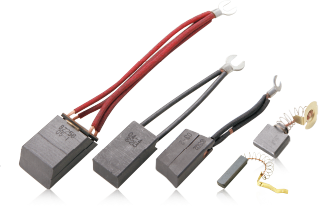

Features of Carbon Brush Products
The carbon brush plays the important role of sending electrical current between motionless and rotating parts by sliding contact. Since the performance of the brush has significant impact of the performance of rotating machine, the choice of brush is a critical factor.
At the Toyo Tanso Group, we develop and produce carbon brushes for a variety of customer needs and purposes, applying the superior technology and quality assurance know-low that we have developed over our many years of research in the fields. Our products exude minimum impact on the environment, and can be used for many different applications.
Excellent self-lubrication and abrasion resistance
Carbon has self-lubricating properties and low coefficient of friction due to its layered crystal structure, making it highly abrasion resistant. The carbon is thus characterized by outstanding abrasion resistance and low friction under conduction, which is important for carbon brush.
Superior conductivity
With its excellent electrical conductivity, carbon can offer a stable, optimal level of electrical resistivity, which is enhanced by appropriate selection of materials and production process depending on the application.
Outstanding durability
Carbon has low coefficient of thermal expansion, which means that it hardly has changes in shape or quality even at high temperatures. It is also resistant to the softening and melt-down that can occur due to sparking during operations, and does not fuse with other metals.
Superior rid ability during sliding contact
Compared to conductive metals in general, bulk density and the Young's modulus are small in carbon, hence carbon has superior ridability during sliding contact.




























